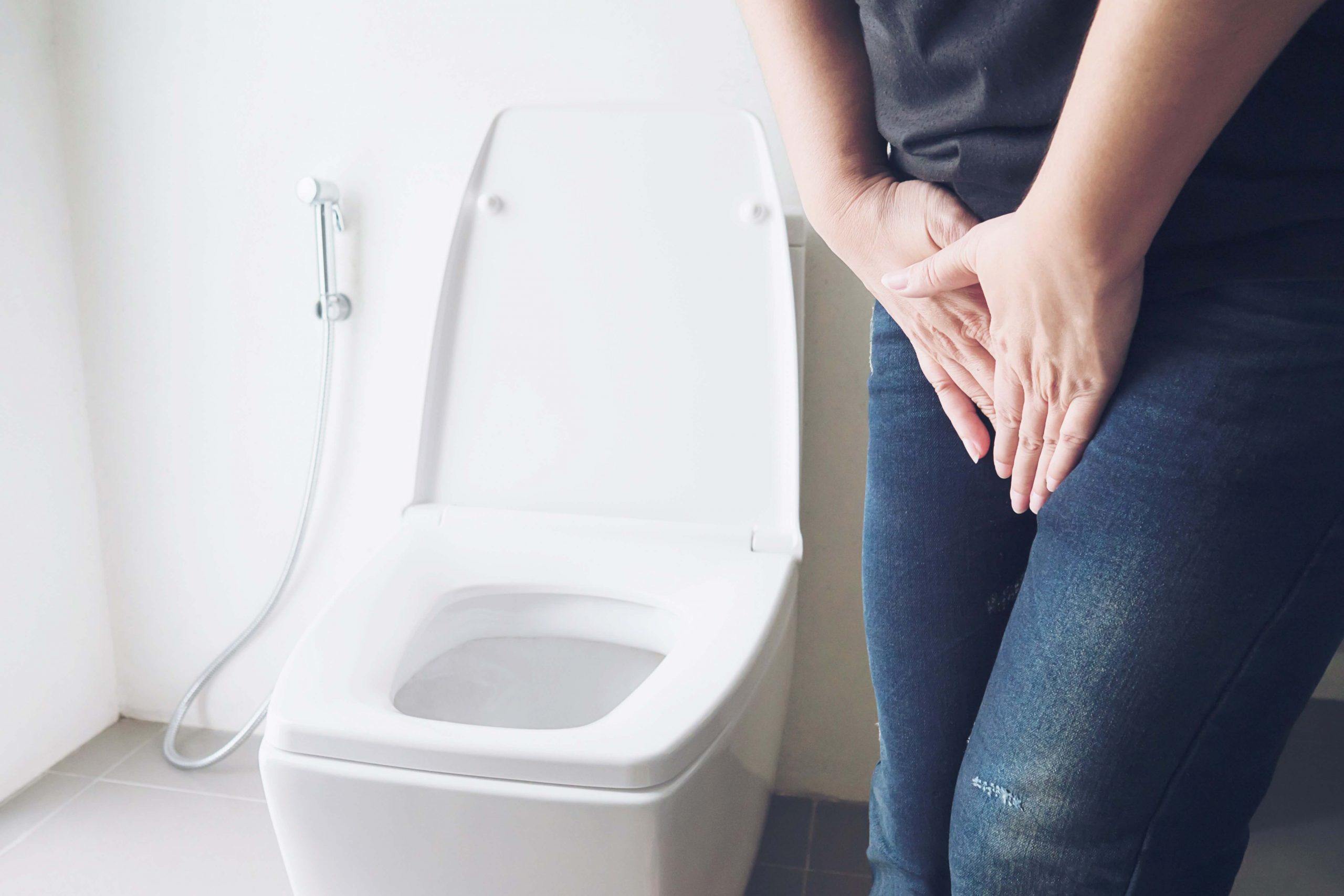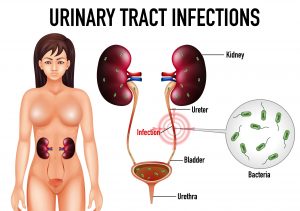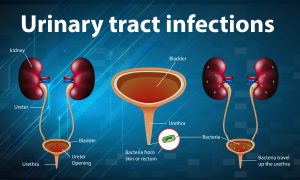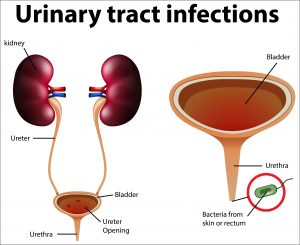Disclaimer:
This article is for information purposes only. It is not a substitute for medical advice or treatment. Seek medical care for your treatment.
Urinary tract infections
Before knowing signs and symptoms of UTI it is necessary to learn a little about urinary tract infections. UTIs are very common and are caused by bacteria. UTI causing bacteria comes from your skin or rectum. These germs enter our body via urethra. Bacterial infection can affect any part of our urinary tract, including kidneys, bladder or urethra.
Bacterial Cystitis: if the infection moves to your bladder it is called bacterial cystitis.
Pyelonephritis: if the infection travels from bladder to the kidneys, then this grave condition is called pyelonephritis. This infection causes inflammation of kidneys and some tissues.
Women are more prone to get UTIs. This is because of their body anatomy which makes it easier for the bacteria to reach bladder or kidneys. Probably 60% of women experience a UTI in their lifetime.
Urinary tract and its parts
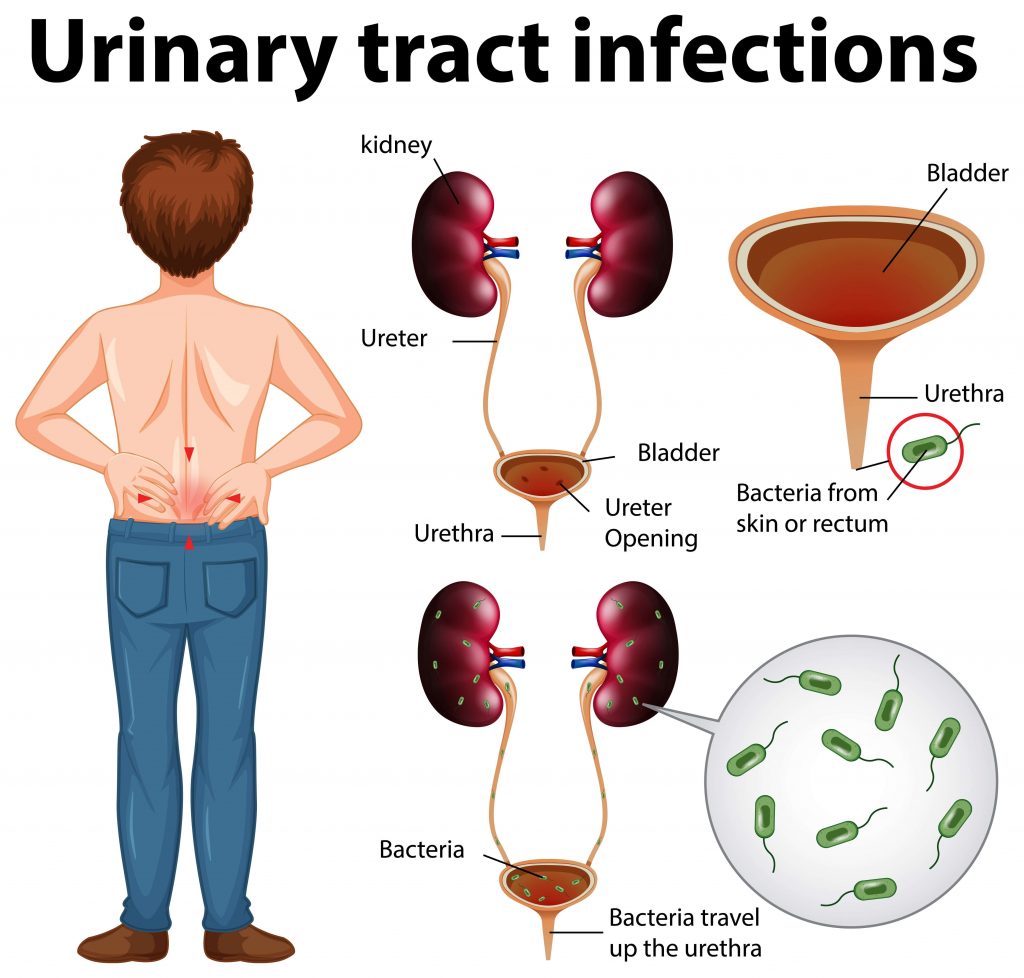
Our urinary tract creates and keeps urine. Urine is the byproduct of our kidneys. Our urine is germ free. It is created when the kidneys eliminate waste and extra water from our blood. Our urinary tract has following parts:
- Kidneys
- Ureters
- Bladder
- Urethra
Causes of infection
Generally UTIs are caused by the bacteria E.coli present in our stomach. Other infection causing bacteria include staphylococcus, proteus, klebsiella, enterococcus and pseudomonas. Some infections in men and women are related to UTI and ureaplasma. Other health conditions like diabetes also lead to UTI.
Diagnosis of UTIs
Your doctor will run some tests to diagnose UTIs:
- Urinalysis
- Urine culture
- Ultrasound
- Cystoscopy
- CT scan
Urinary tract infection treatment
Infection needs to be treated in right time. Lower urinary tract can be treated easily. Upper urinary tract infection is more tricky to cure and can infect the blood. Antibiotics are used to cure UTIs. Your healthcare provider will choose the best antibiotic regarding your infection. Some commonly used antibiotics are:
- Sulfonamides
- Nitrofurantoin
- Amoxicillin
- Cephalosporins
- Trimethoprim
- Doxycycline
- quinolones
Fluoroquinolones is also an antibiotic and is not suggested for UTIs because its risks outshine its benefits. It is imperative to complete your antibiotic course devotedly to avert recurring infections.
Cranberry juice: helps in preventing UTIs. Cranberry juice contribution to UTI treatment is conflicting. Still, many people prefer unsweetened cranberry juice or cranberries for the infection treatment. Cranberry has tannin that confronts E. coli bacterium, residing in our bladder.

5 signs and symptoms of UTI
UTIs are very common but that does not mean you can take it lightly. Delaying or ignoring UTI symptoms might harm our kidney and bladder and can lead to stubborn, recurring infections. It is significant to know these 5 eminent signs and symptoms of UTI to prevent you from any further health damage:
- Recurrent urination

You may feel to empty your bladder more persistently than usual. Bacteria irritate the urinary tract that forces you to empty your bladder. UTI causes a vigorous and repeated urge to urinate. Women having UTIs have really strong urge to urinate right after they have already emptied their bladder. You feel like you can’t hold it anymore and you have to rush to the toilet. The persistent urge to urinate is because of the inflammation and irritation in the lining of the urethra or bladder. Some of the evident symptoms of UTI are persistent, frequent and having strong urge to urinate.
- Pain or burning sensation when urinating
You feel pain or burning sensation when you pee if you have UTI but sometimes this symptom can signal towards another disease called sexually transmitted disease. You may feel uneasy, sharp pain as you pee. The stinging sensation may stop you in the middle of the urination. This symptom is not normal and should not be taken casually. In this case consult your health care provider.
- Red or cloudy urine
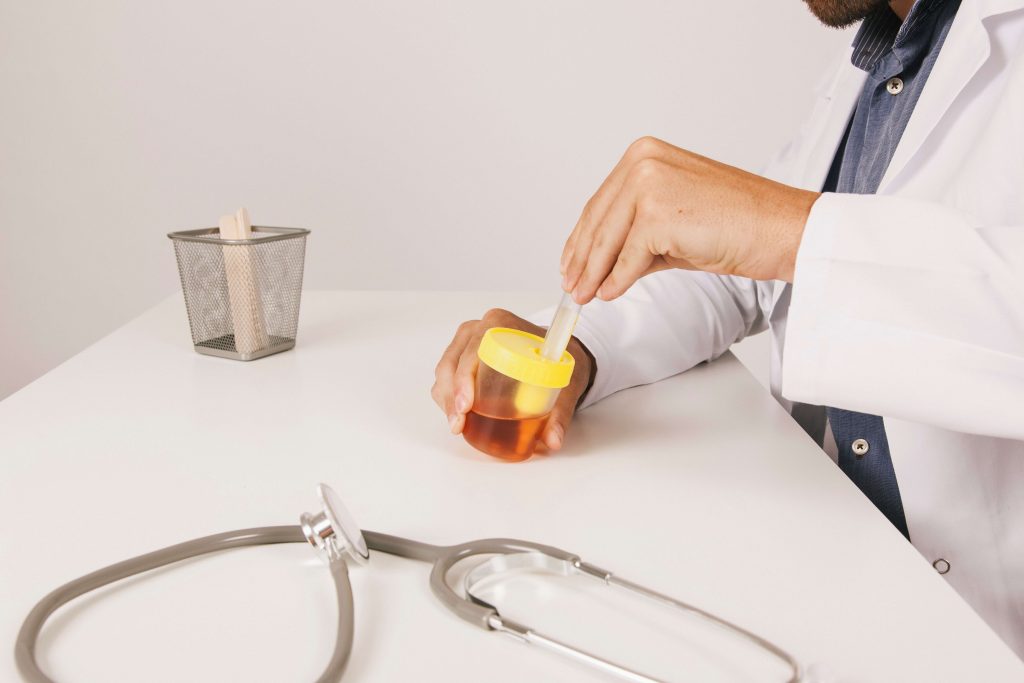
Generally our urine is transparent, dark yellow or colorless. Nevertheless a UTI can make urine look murky or cloud. You might surmise that the murky appearance is because of the bacteria residing in our urinary tract, the appearance is a signal of an immune response to the bacteria and not from the bacteria itself. When you are hit by any infection, the white blood cells congregate to the area to combat your infection. White blood cells make urine look cloudy because you excrete them in urine.
You may observe pink or cola-coloured urine. This is an indication towards some grave infection, which needs to be treated immediately. Pink or red urine hints that there is blood in your urine blood. When you are having a UTI, blood may eject from kidneys or urinary tract. Persistent urination or blood in urine needs some serious attention promptly.
- Foul smelling urine
Urine has its own smell and you can’t assume that it smells good. A strong foul odour from your urine is another evident symptom of UTI. You might notice the bad smelling urine symptom before the change in the appearance of your urine. You can simply sniff out a UTI, if you have a bacterial infection or not. Some women with mild infections can easily smell the strong odour of urine, which may be the only visible symptom for them.
- Small amounts of urine and pelvic pain

In UTI all the time, you will have an intense urge to urinate but you will be alarmed to discover that when you urinate, you only pee a little. The urgent need to empty your bladder is not linked to the amount of urine in your bladder but it is a result of bacterial infection distressing the urinary tract and its parts.
The aches and discomfort in your pelvis, abdomen and lower back are viable symptoms of urinary tract infection. Weariness besides pain in lower torso signals towards an aggravating UTI. If your pain travels from middle to upper back, this could be an indication that the infection has reached to your kidneys. If you have these symptoms don’t waste your time because they will not disappear on their own. Consult your doctor.
Prevention
Practice these following simple preventive measures to keep infections at bay:
- Regularly drink plenty of water.
- Always clean from front to back after a bowel movement.
- Practice good hygiene habits.
- Avoid citrus foods or fluids that could irritate your bladder.
- Many people find unsweetened cranberry juice healing.
- Don’t hold your pee, empty your bladder soon.
- Abstain from scented feminine products.
- Change your birth control methods.
- Reconsider your clothing style.
Conclusion:
UTIs are prevalent all around the world. UTIs can attack your bladder, urethra, ureters or kidneys. Generally infection is caused by bacteria and sometimes by viruses or fungi. Aforementioned clear symptoms can help you diagnose UTIs. Don’t ignore these signs and symptoms. After knowing the symptoms it is necessary to meet your healthcare provider for further treatment. Early detection is the best prevention.

